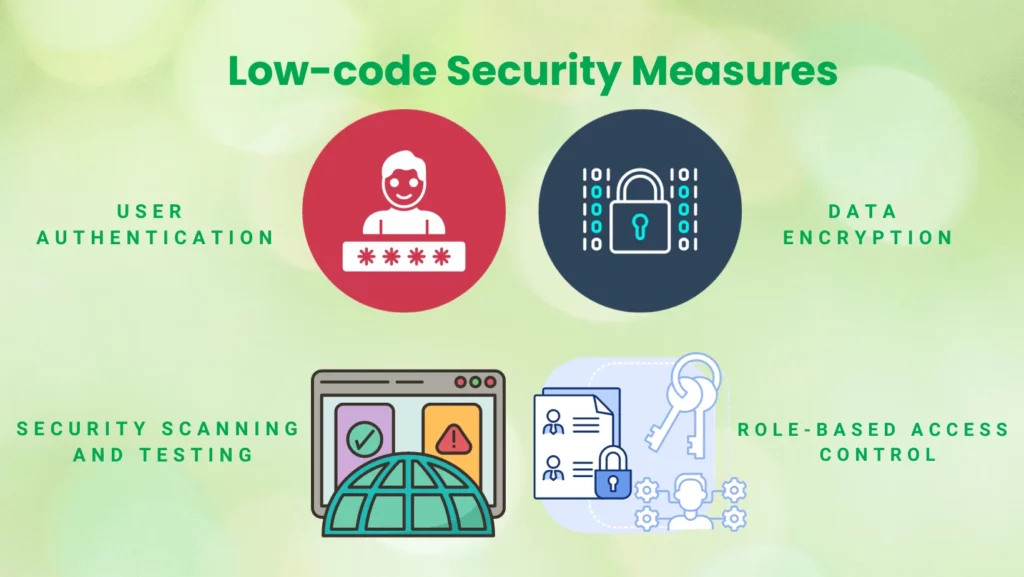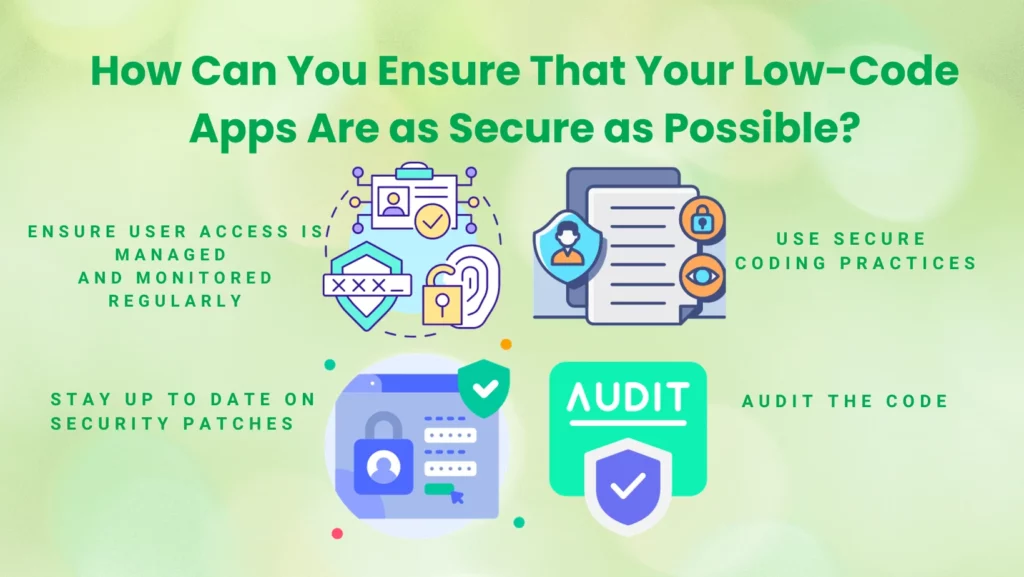Are you exploring the possibilities of low-code development for your organization? Low-code solutions and platforms offer a massive range of advantages: They’re faster to develop, easier to deploy, and provide immense flexibility when it comes to creating custom applications tailored specifically around user needs. But while these options might be immensely appealing from a cost and time savings perspective, there is one question that must always be asked: Is low-code software secure?
In this article, we’ll explore the security concerns associated with this type of development—noting common points of vulnerability as well as recommended steps organizations can take to ensure top-notch protection. Be sure to keep reading to learn more!
Table of contents
- Are you looking for a secure and versatile way to develop software?
- What is Low-Code Development and Why is it Popular Nowadays?
- What are the Benefits of Low-Code Software Development?
- How Secure Is Low-Code Software for Businesses?
- How Can You Ensure That Your Low-Code Apps Are as Secure as Possible?
- Citizen Development and Tailored Digital Experiences
- What Industries Can Benefit from Using Low-Code Solutions ?
- How to Maximize Security When Creating Low-Code Solutions ?
- Frequently Asked Questions About The Security and Flexibility of Low-Code Development: Is Low-Code Software Secure?
- Conclusion
Are you looking for a secure and versatile way to develop software?
Low-code development is quickly becoming the preferred method of developing applications. With low code, you can easily create intuitive, powerful apps without having to dive deep into coding – perfect for businesses that lack the resources or technical know-how. But you’re probably wondering one thing… is low-code development secure?
The answer is yes! Low code comes with built-in security layers and offers control over user access to ensure sensitive data remains protected even after deployment. It also makes it much easier to scale up applications as needed due to its modular design — while keeping your data safe no matter what environment it resides in. So if flexibility and security are top priorities for you, look no further than low-code development solutions!
Did you know?
- Low code/ no-code solutions have the potential to reduce the development time by 90%. (Redhat)
- The average data science salary is $101k. (U.S. Bureau of Labor Statistics)
- 82% of firms say custom app development outside of IT is important. (451 Research)
Read on and learn how secure Low-code software is!
What is Low-Code Development and Why is it Popular Nowadays?

Low code development creates applications using a combination of visual elements and coding, allowing developers to get complex web and mobile apps up and running quickly. This makes it ideal for organizations that lack the resources or technical know-how needed to create custom software solutions from scratch.
Low code development also provides incredible flexibility in terms of customization—you can easily add features, change user interfaces, and adjust settings as needed. This makes it perfect for creating applications that are tailored to individual user needs and preferences – without having to sacrifice security.
The Low-code development platforms are getting popular due to their capabilities. Just like with no code tools, they don’t require coding skills and offer a range of features that make it easy to create powerful applications without the need for complex coding. On top of this, they offer more flexibility when it comes to security, allowing you to set access levels for each user and protect data even after deployment.
What are the Benefits of Low-Code Software Development?
Low-code platforms offer a range of benefits that make them an attractive option for organizations looking to create applications with speed and efficiency. Here are some of the key advantages:
- Faster development: Low code platforms allow developers to quickly create powerful, custom apps without having to write lines upon lines of code.
- Ease of customization: With low code, it’s easy to customize applications to fit user needs and preferences.
- Greater flexibility: Low code platforms offer the flexibility needed to scale up applications as required, without having to worry about data security.
- Improved collaboration: Low code solutions also make it easier for developers and other stakeholders to work together on projects by providing an intuitive platform that everyone can access.
- Better customer experience: Low code platforms also make it easier to create applications that offer a better customer experience, as they are designed with the user in mind.
These are just a few of the many advantages of low code development that make it a popular choice for businesses looking to create applications quickly and efficiently.
How Secure Is Low-Code Software for Businesses?

Low-code security concerns are legitimate; however, a comprehensive security strategy can go a long way in mitigating any risks associated with the development process.
Below are some of the low-code security measures:
- User authentication: This ensures that only authorized users can access the application and its data.
- Data encryption: Securely encrypting data helps protect it from unauthorized access and tampering.
- Role-based access control: This allows you to set permissions for who can view or edit certain parts of the application, so only those with permission have access.
- Security scanning and testing: Regular security scans can help identify any vulnerabilities that may exist in the system. Additionally, frequent testing of the application’s code and architecture ensures its functionality as well as helps to identify any potential weaknesses.
When it comes to low-code development, these strategies are essential for ensuring a secure environment for your application and data. When compared to traditional coding, low-code development offers far better security and peace of mind for businesses.
How Can You Ensure That Your Low-Code Apps Are as Secure as Possible?

There are several steps businesses can take to ensure their applications remain secure:
Ensure user access is managed and monitored regularly
User access should be controlled and monitored regularly to prevent unauthorized users from accessing sensitive data or making changes to critical components of the application.
Stay up to date on security patches
It’s important to ensure that the low-code platform is kept up to date with all available security patches to help protect against potential vulnerabilities and attacks.
Use secure coding practices
Organizations should use secure coding practices when developing applications, as these can help reduce risks associated with bugs and other security issues.
Audit the code
Auditing the application’s code regularly can help identify any potential issues or flaws, which can then be addressed before they become a major concern.
Security testing, software security, and static code analysis are also important components of any low-code security strategy. By implementing the right measures, businesses can ensure that their applications remain secure and reliable.
Citizen Development and Tailored Digital Experiences
Citizen developers create applications that empower users from all parts of the organization to leverage the power of technology. Low-code platforms are designed to make it easy for anyone to create custom, tailored digital experiences that are secure and reliable; they’re also highly flexible and scalable, so businesses can easily adjust their applications as needed.
These platforms offer a range of features that make it possible for citizen developers to quickly create, deploy, and manage applications with ease. This includes features such as drag-and-drop development tools, visual workflow builders, and pre-built components that make it easy to build powerful applications without coding skills.
Low-code platforms also provide an agile way of working by enabling teams to make changes and adapt their applications quickly in response to customer needs. With these platforms, businesses can create digital experiences that are tailored to their organization’s specific requirements – all while keeping data secure and protected.
What Industries Can Benefit from Using Low-Code Solutions?

Like with no-code software, low-code solutions can be used by many different types of industries and offer the flexibility to create custom applications that cater to any type of business need.
Businesses in all industries can benefit from using low-code solutions as it enables them to quickly build and deploy applications that are tailored to their specific requirements. Here are some of the industries that can benefit from using low-code solutions:
Healthcare
Low-code solutions enable healthcare providers to quickly create and deploy applications that help streamline processes, improve patient care, and reduce costs.
Retail
Low-code solutions can help retailers create custom applications that enable them to provide a better customer experience, reduce costs, and increase efficiency.
Financial services
Banks and other financial institutions can use low-code development to increase transparency and improve their operations.
Government
Agencies can use low-code solutions to quickly develop cost-effective applications that help them better serve the public.
Manufacturing
Low-code applications can help improve production processes, reduce costs, and speed up delivery times.
The application development capabilities offered by low-code solutions make them an ideal choice for businesses in any industry.
How to Maximize Security When Creating Low-Code Solutions?

Security risks are always a concern when creating low-code applications, but businesses can take steps to ensure that their applications remain secure.
Here are some tips for how you can maximize security when creating your low-code apps:
- Use only trusted and approved development tools.
- Ensure the platform provider has robust security protocols in place.
- Implement user authentication and access control measures.
- Use secure coding practices and keep your code up to date with the latest security patches.
- Regularly audit the application’s code for any potential flaws or vulnerabilities.
- Utilize system monitoring tools and analytics to ensure the platform is always running correctly.
Frequently Asked Questions About The Security and Flexibility of Low-Code Development: Is Low-Code Software Secure?
Q: Is low-code software secure?
A: Yes, low-code platforms are designed to provide a secure environment for applications and data. Businesses can maximize security by using only trusted and approved development tools, ensuring the platform provider has robust security protocols in place, and implementing user authentication and access control measures.
Q: What industries benefit most from low-code solutions?
A: Low-code solutions can be used by businesses in any industry to quickly create custom applications that cater to their specific needs. Some of the industries that benefit most from low-code solutions include healthcare, retail, financial services, government, and manufacturing.
Q: How security teams can maximize security when creating low-code applications?
A: Security teams should use only trusted and approved development tools, ensure the platform provider has robust security protocols in place, implement user authentication and access control measures, and use secure coding practices.
Conclusion
Low-code development tools and software have enabled businesses to scale faster and move with greater flexibility in today’s digital world. With its ability to quickly deliver applications, it could be a great choice for cost savings and efficiency. When used correctly and under the watchful eyes of experts, low-code software offers good security with great flexibility that makes it a viable option for any organization that is looking for quick results while still maintaining a strong focus on security requirements.

